INNOVATE RECONCILIATION ACTION PLAN
JANUARY 2024 - JANUARY 2026

Ormond College acknowledges the Traditional Owners of the land on which the campus sits, the Wurundjeri People of the Kulin Nation. The Wurundjeri People are the people of the wurun, the river white gum, who have been custodians of this land for thousands of years. We pay our respects to all Aboriginal and Torres Strait Islander Elders – past, present, and emerging.

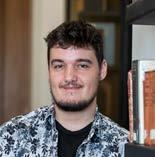
RYAN ARCHER (2020)
RAP Creative, Ormond College alumnus and 2022 Head of Indigenous Subcommittee
The visual design for the RAP represents Ormond College’s journey towards cultural understanding and inclusivity. The presence of an Indigenous strategy is highly important for the Ormond community. The Ormond community and our RAP programs can often serve as an introduction to cultural heritage and learning for many Ormond students, staff and friends. It plays a crucial role in improving the cultural atmosphere within and beyond the college, making it a safer and more informative space for everyone. As the college continues to grow its cultural understandings, spaces and leaders, it creates a prosperous environment for all students, staff and community members - both First Nations and non-Indigenous.
CONTENTS Abbreviations 1 Our Vision for Reconciliation 3 From the Master - Lara McKay 5 From the Student Club Indigenous Subcommittee Chair – Guruji Wagner 6 Our Community 7 Our Reconciliation Action Plan 2024-2026 9 Our Journey 11 Our Learnings 15 Creating this Reconciliation Action Plan 16 Relationships 19 Respect 22 Opportunities 25
ABBREVIATIONS
‘First Nations’ and ‘Indigenous’ is used to refer to Aboriginal and Torres Strait Islander Peoples within the phrases of established groups or programs such as the ‘Ormond College Indigenous Program’ and the ‘Indigenous Subcommittee’
Elsewhere in the document we use the term ‘First Nations’. We will continue to revisit whether these terms are appropriate within our community as we continue our reconciliation journey. We acknowledge that Aboriginal and Torres Strait Islander Peoples and First Nations’ communities may identify with other names, and we mean no disrespect when using these terms.
• ABSTUDY – Aboriginal and Torres Strait Islander Student Centrelink Support
• COIO – Chief Operating and Innovation Officer
• GC – Students’ Club General Committee
• HR – Human Resources
• JCR – Junior Common Room
• MCR – Middle Common Room
• MCRC – Middle Common Room Committee
• NAIDOC – National Aboriginal and Islander Day of Celebration
• NRW – National Reconciliation Week
• OCIP – Ormond College Indigenous Program
• OCSC – Ormond College Students’ Club
• RAP – Reconciliation Action Plan
• SCR – Senior Common Room
• SMT - Senior Management Team
• SSC – Student Support Committee
Vice Master’s Office
T: 03 9344 1100
E: vicemaster@ormond.unimelb.edu.au
CONTACT DETAILS
Innovate Reconciliation Action Plan 1
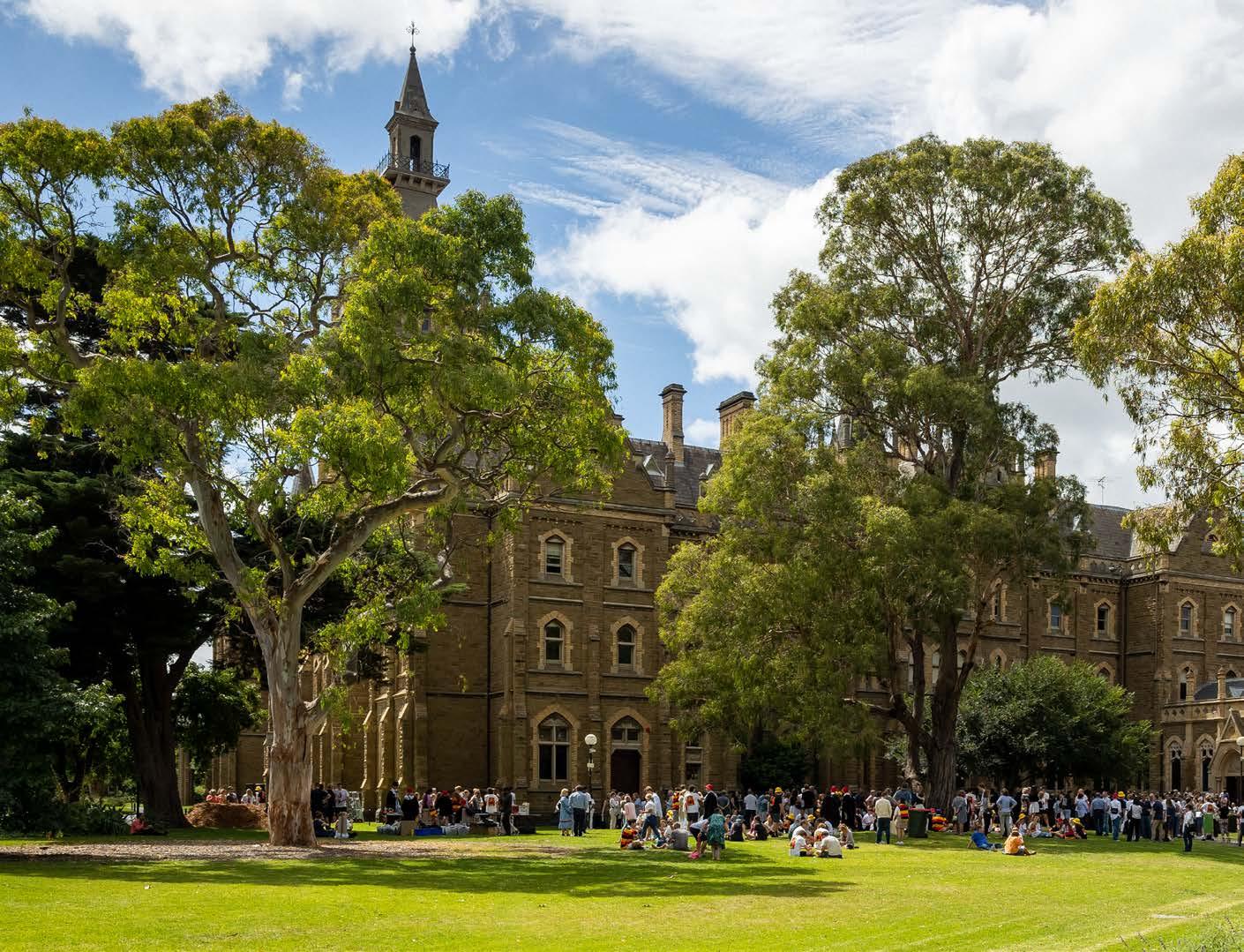
2 20242026
OUR VISION FOR RECONCILIATION
SELF-DETERMINATION: OUR SHARED RESPONSIBILITY
• At Ormond, we believe the best pathways for reconciliation lie within the leadership and ideas of First Nations people. Together, we champion self-determination, by actively supporting the ambition of First Nations Peoples and strengthening the network of informed and engaged allies within the broader Ormond community.
• We support First Nations Ormondians to fulfil their potential, expand their horizons and make a disproportionate difference.
• We strive to be a safe, welcoming and enriching living and learning environment for First Nations students to determine their success and pursue their passions.
• We amplify the voices of First Nations people through strong relationships and mutually beneficial partnerships with First Nations communities, industries and leaders.
• We facilitate meaningful processes of truth-telling and cultural learning for all members of our community so that we collectively integrate and champion reconciliation.
Our journey towards reconciliation involves our students, staff, alumni, friends and partners - everyone in the Ormond community has a key role to play in advancing reconciliation outcomes.
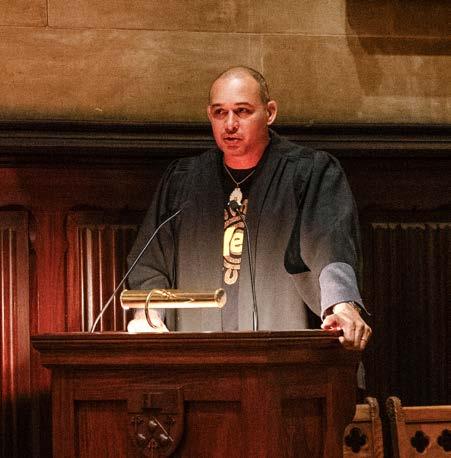
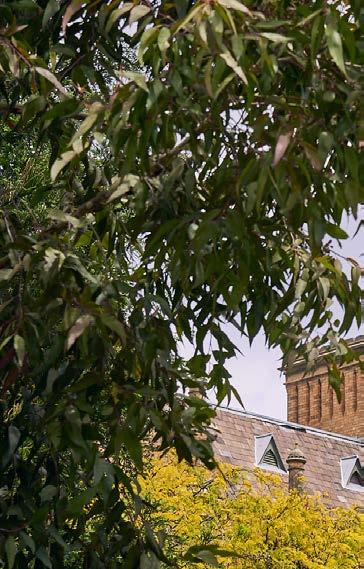

Innovate Reconciliation Action Plan 3
Left: Thomas Mayo delivering the Uluru Statement from the Heart at Formal Hall. Top right: Undergraduate students gather on Picken Lawn. Bottom left: Ormond’s Man+ Rugby team. Bottom right: Ormond’s Women+ Rugby team in intercollegiate competition with Trinity College.
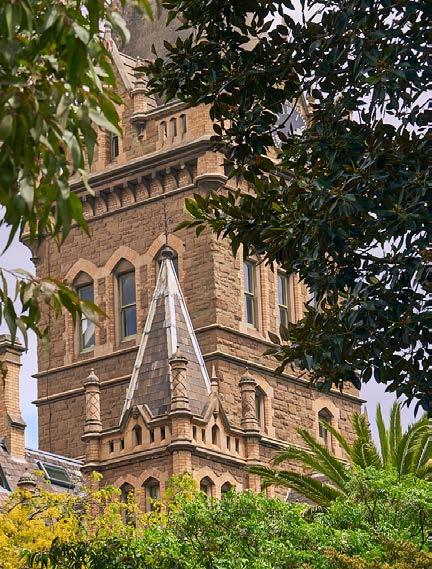
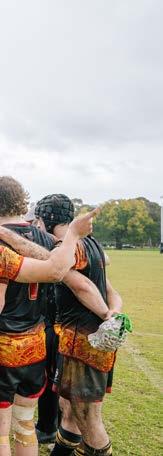

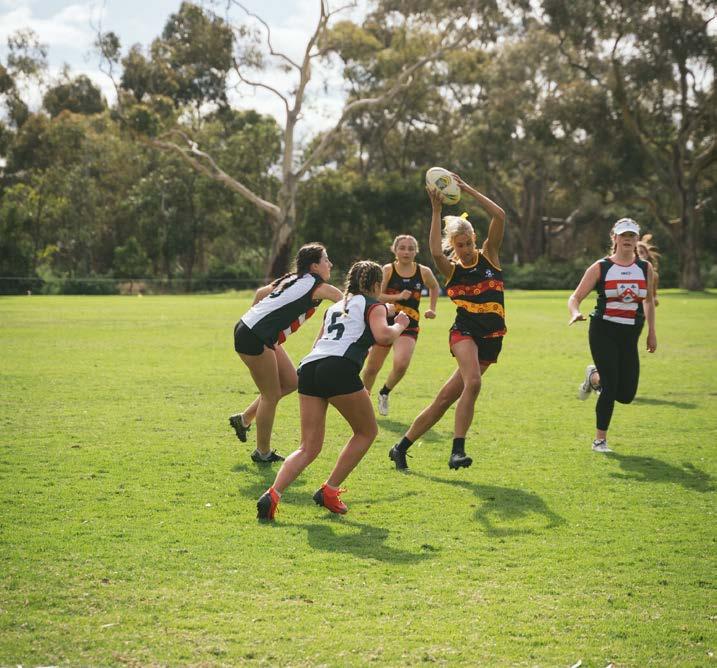
4 20242026
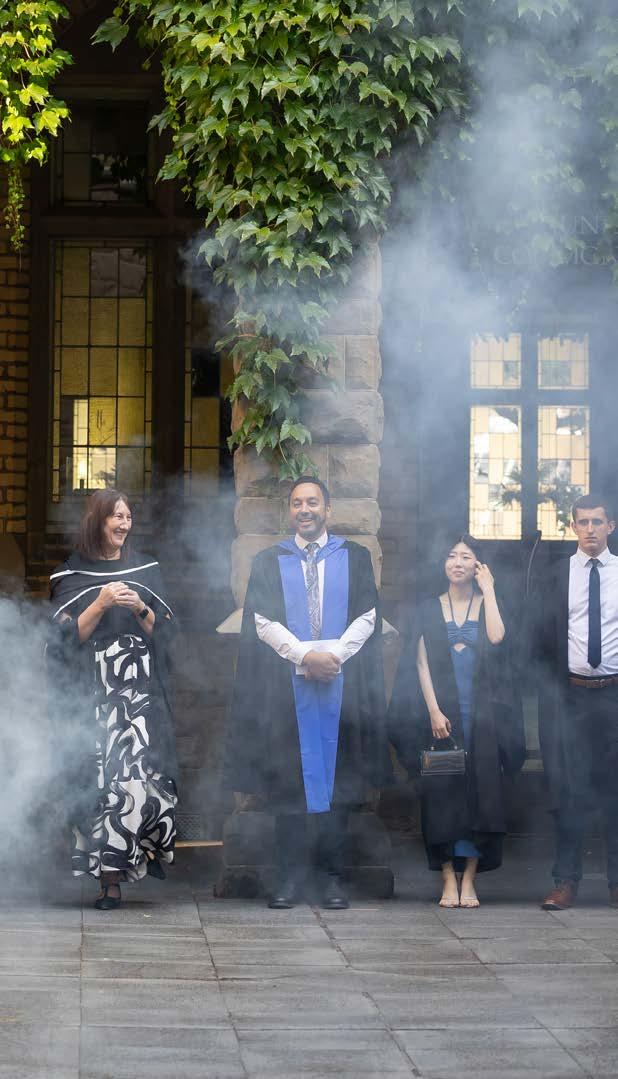
FROM THE MASTER - LARA MCKAY
When appointed as the College’s tenth Master in 2018 I was pleased to see Ormond’s commitment to reconciliation One of the first College events I attended was an event to celebrate the 10th anniversary of the Ormond College Indigenous Program and it was here that I met some outstanding First Nations students who had joined the Ormond community in that preceding decade These were deeply impressive young people who shared their journey through College and their valuable contributions to society While I continue to be inspired by the talent and potential of First Nations Ormondians, it was clear in 2018 that we had more work to do
Since then, I am proud of a number of new initiatives put forward by both students and staff. These include increased cultural awareness training for all members of our community, a commitment to ongoing education through the First Nations Voices Project and a greater focus on recruitment of First Nations staff. Yes, we still have more work to do.
Like many organisations, realising the aspirations of our last RAP was challenged by the global COVID-19 pandemic. Our recruitment of First Nations students is so dependent on our ability to travel and visit schools and establish meaningful connections. Unfortunately, we saw a decline in the number of First Nations students joining the College. With ongoing lockdowns, travel restrictions and exacerbated staff turnover, we also experienced operational challenges that
interrupted the momentum of our First Nations programs. However, this remains a priority area for our community and our shared values.
Our 2024 Innovate RAP embodies a shift in focus from important foundations, established over prior years, to focus on community, First Nations voices and leadership. While we continue to enhance our foundational programs, our goal is to facilitate an environment where First Nations Ormondians can find both grounding and guidance. We hope to support students in their pursuit of excellence, working with First Nations leaders, partners and friends to support important connections with community and Country. These connections, and the learning they offer, are just as vital as the education we offer. These commitments can only be realised effectively when our whole community embraces these important goals. One of the most compelling things about leading the Ormond community is our deep shared values: community, integrity, respect, learning, heritage and diversity. It is this shared sense of purpose that gives me confidence that every member of the College community will play a role in realising this RAP.
After taking one step back, we are now able to take two steps forward.
Innovate Reconciliation Action Plan 5
Lara greeting graduate students during a Welcome to Country.
FROM THE 2023 STUDENT CLUB INDIGENOUS SUBCOMMITTEE CHAIR – GURUJI WAGNER
As Chair of the Indigenous Student Subcommittee, and as a Yidinji man from Far North Queensland, I am heartened by our community’s collective commitment to reconciliation I’m excited, too, for the further elevation of First Nations knowledges and cultures within our academic and social life This not only supports the academic, career and leadership development of Mob at Ormond, but it allows us to share our stories and worldview with all Ormondians Through countless conversations, it’s evident that our community is eager for a future that genuinely respects and celebrates the richness of First Nations cultures
Central to the evolution of the Reconciliation Action Plan is the collective feedback from the student body. The reflections, experiences, and aspirations voiced by our peers continue to form an important barometer for this RAP, ensuring that our steps towards reconciliation are both informed and impactful. I look forward to working closely with the College staff, and fellow members of the RAP Working Group, ensuring that the student experience is embedded in this iterative process of listening and adapting.
While the path to true reconciliation is long and filled with complexities, the genuine intentions and collective will of the Ormond community give me hope for a stronger future. It has been rewarding to watch the community come together to produce commitments that reflect the importance of First Nations representation, support, and cultures at Ormond.

6 20242026
Guruji Wagner and Vice Master Dr Areti Metuamate.
OUR COMMUNITY
Ormond College was established in 1881 on the land of the Wurundjeri People
In the spirit of its benefactor, Francis Ormond, and the philosophies of the Presbyterian Scottish Enlightenment, the College was open to people of ‘all faiths and none’ as a place to develop the skills and incentive to contribute to the broader community in vocational and academic pursuits Today the Ormond College community continues to strive for social responsibility and academic integrity for students, staff and alumni In doing so, the College celebrates Francis Ormond’s legacy while acknowledging uncomfortable truths about the circumstances under which he was able to establish and grow his wealth
We operate as a residential university college, home to undergraduate students, graduate students, non-residents, residential and non-residential academics and tutors. Our community also includes a large alumni cohort and employs a range of academic, student support, and operational staff members.
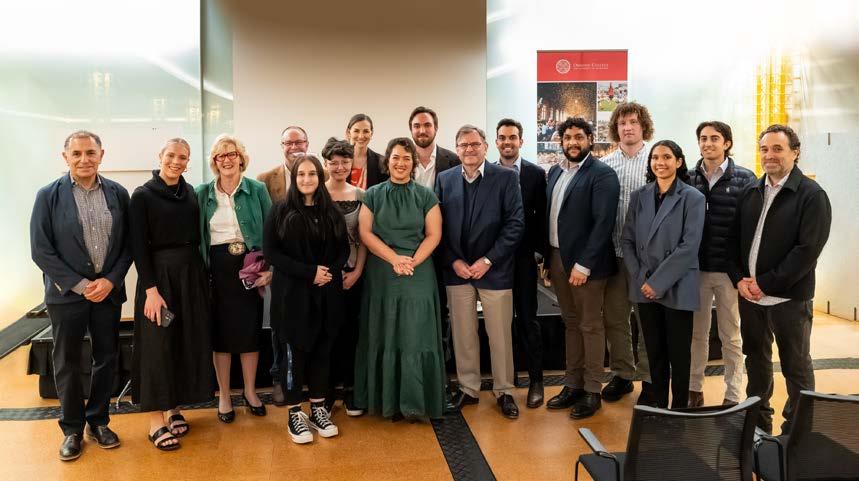
Ormond College has a single office location in Parkville in Victoria, but the community also includes alumni and students residing in all states and territories of Australia and countries throughout the world. The campus is also home to the Wade Institute of Entrepreneurship, which is a leading centre for entrepreneurial training. The Wade Institute offers programs that deliver immersive education to accelerate learning, creation, connection, and significant community engagement.
Of our total staff of 73 people, two staff members identify as First Nations people. Of our 433 residential students, 18 identify as First Nations people. These students join a growing community of over 200 First Nations Ormond alumni. We are also pleased to host independent residential fellows, including recognised academic, professional or community leaders. Two First Nations residential fellows currently call our community home: Todd Fernando, a descendant of the Kalarie peoples of the Wiradjuri nation; and Jessa Rogers, a Wiradjuri woman. Both have made generous contributions to the Ormond community and to broader communities, too, as scholars and advocates. We endeavour to welcome more visiting First Nations fellows.
Innovate Reconciliation Action Plan 7
The College’s sphere of influence is broad, encompassing students, staff, alumni, partners and the wider community. The College is committed to working with all stakeholders to promote reconciliation and build a better future for all Australians. However, we pay particular attention to areas in which we believe our efforts can realise the most profound and scalable impact. This relates to our role as a place of education and community for future leaders of all backgrounds.
Through the University of Melbourne’s First Nations truth-telling research project, ‘Contested histories of the University of Melbourne’, we have a deeper understanding of our institutional and colonial past, including the history of Francis Ormond.
The Ormonds amassed significant wealth during the 1800s as settler pastoralists in Western District Victoria. Francis Ormond became one of the most prominent philanthropists of the 1880s, founding Ormond College and Working Men’s College (now RMIT). While we often celebrate Francis Ormond’s achievements, generosity and legacy, it is often left unacknowledged at whose expense this benevolence was derived. Specifically, the Wadawurrung Traditional Owners.
Research shows that Traditional Owners were displaced and mistreated during the occupation of the Western Districts of Victoria in the 1840s – around the time that Francis Ormond’s family
arrived. While there is little evidence of acute violence from the Ormond family, such actions were common in the Western Districts of Victoria, and therefore something that members of this community are affiliated with, either directly or indirectly.
It is well documented that the Ormond farms operated on Wadawurrung land and employed First Nations peoples. Exploitative labour practices - including underpayment, and payment in rations - were almost universal for First Nations people in this region and era. As part of Ormond College’s commitment to reconciliation, we acknowledge this uncomfortable truth.
Understanding our history – from whose displacement, land and labour our community benefits – is incredibly important. It underpins our community’s commitment to reconciliation and change. We thank the University of Melbourne for conducting this important research, and acknowledge Ormond alumna, Professor Zoë Laidlaw (1991), who was a key contributor to the study.
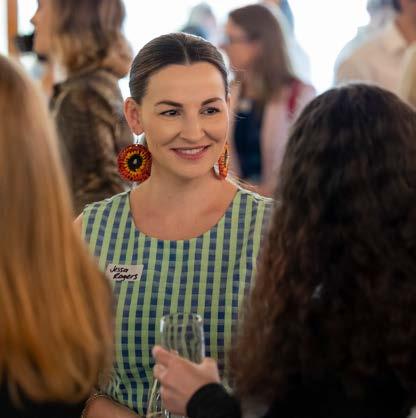
From left to right: Larry Kamener, Ayla Cheatham, A/Prof Jane Freemantle OAM, Prof Barry Judd, Kitana Price, Isabel Natividad, Dr Jessa Rogers (Wiradjuri), Catherine Liddle (Arrernte/ Luritja), Caleb Adams, Vice Chancellor Professor Duncan Maskell, Guruji Wagner, Dr Todd Fernando (Wiradjuri), Max Braybrook, Amba-Rose Atkinson, Marley Wagner, Martin Kamener.
Above: Dr Jessa Rogers, an Aboriginal education leader and a Residential Fellow of the College.
Left: 2023 Renate Kamener Oration.
8 20242026
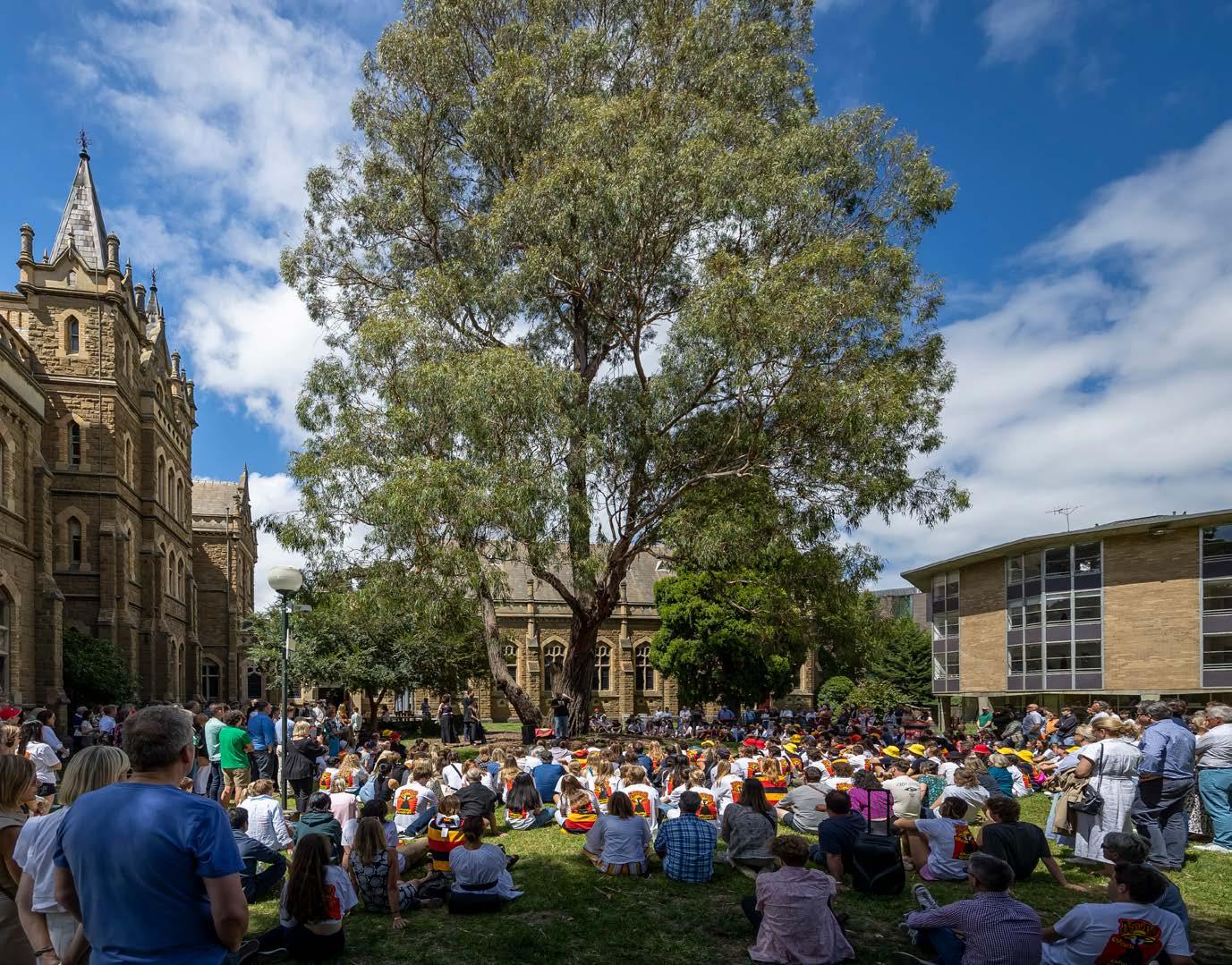
OUR RECONCILIATION ACTION PLAN 2024 - 2026
Innovate Reconciliation Action Plan 9
2023 Welcome to Country by Wurundjeri Woi-Wurrung Elder Uncle Bill Nicholson.
Our fourth Reconciliation Action Plan (RAP) embodies the College’s ambition to build upon the achievements and learning of previous RAPs and places a heightened focus on principles of self-determination and First Nations voices In practice, we have adopted four focus areas:
FIRST NATIONS EXCELLENCE
The College will support and champion the ambitions of First Nations peoples.
• Foster a community of culturally strong and connected First Nations students.
• Uphold cultural safety and antidiscrimination principles.
• Support academic excellence and promote opportunities.
• Foster leaders, creativity and inspire innovation.
AMPLIFY FIRST NATIONS VOICES
The College will actively engage First Nations peoples to guide us.
• Establish a First Nations-led RAP advisory group.
• Build mutually beneficial partnerships.
• Build strong relationships with local Traditional Owners.
• Facilitate connections between First Nations stakeholders and our community.
TRUTH-TELLING & CULTURAL LEARNING
The College will understand and elevate the history and experiences of First Nations People.
• Deliver continual cultural learning for all staff and students.
• Actively promote and engage in truth-telling.
• Consider First Nations perspectives in our policies, programs and operations.
In addressing these four focus areas, our fourth RAP consists of several core aims:
• To improve the student experience and opportunities for self-determination.
• To foster a shared sense of responsibility of reconciliation for all members of our community.
• To centre and normalise the teaching of First Nations Peoples’ histories, cultures and contemporary experiences amongst all staff and students.
• To grow our visibility of – and partnerships with – First Nations community leaders, businesses and organisations.
• To strengthen internal governance structures, ensuring effective implementation, meaningful engagement and longevity.
• To improve business and policy processes, ensuring First Nations students and staff can thrive in a culturally safe environment.
INCLUSIVE ECONOMIC DEVELOPMENT
The College will increase First Nations participation in our business operations.
• Establish programs and initiatives to increase opportunities for First Nations peoples within our supply chain.
• Establish programs and initiatives to increase opportunities for First Nations peoples within our workforce.
10 20242026
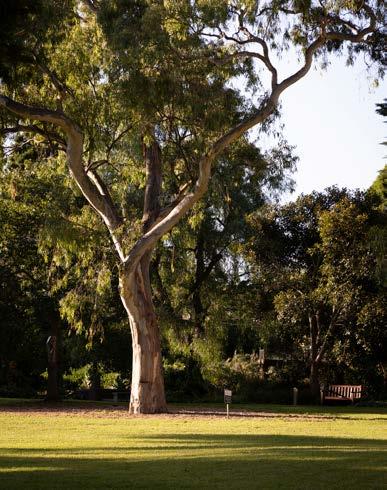
OUR JOURNEY
This 2024-2026 Innovate RAP follows on from our initial RAP (2013-2015), our Reflect RAP (2016-2017), and most recently, our Innovate RAP (20182020) Looking back on this journey the Ormond College Indigenous Program (OCIP) previously focussed on three key determinants of our long-term vision We will continue to deliver and refine these ‘business as usual’ programs
• Access: Encourage access to our community
• Safety & Wellbeing: Cultural Safety, cultural learning and wellbeing support

Academic and career guidance
Looking forward, we continue to refine our existing programs, recognising that our community still has a long way to go. Additionally, we aim to build upon these programs across three key focus areas. We will deliver new programs, expanding the impact and depth of Ormond’s existing reconciliation efforts. We will explore pathways for innovation and growth for programs that may not be delivered during
Elevate First Nations knowledges, research and experiences through our academic programs.
Community: Promote strong relationships with community leaders, Elders and Traditional Owners, to mentor First Nations students, and guide an appropriate College strategy.
Leadership: Facilitate leadership development opportunities and programs for First Nations students
When Ormond College developed its first RAP, it was motivated by the determination of the student body to promote equality and reconciliation within the College. Our second and third RAPs provided the frameworks to embed First Nations histories and cultures and increase our efforts to support ongoing reconciliation initiatives. Some of our achievements and programs are outlined below.
Innovate Reconciliation Action Plan 11
Vice Master Dr Areti Metuamate discussing First Nations governance with students.
ORMOND COLLEGE INDIGENOUS PROGRAM
The Ormond College Indigenous Program (OCIP) is inextricably linked to our RAP and our community’s commitment to reconciliation. While every member of the College community is responsible for implementing the commitments made in this RAP, the program is overseen by dedicated staff, namely the Vice Master and the Freemantle Fellow. The position of Freemantle Fellow was established as an outcome of our previous RAPs and serves as the central point of contact for the OCIP. The Freemantle Fellow works in tandem with the Ormond College Students’ Club (OCSC) Indigenous Subcommittee, a student-led group with First Nations’ and nonIndigenous membership that organises events for the whole community to promote reconciliation at Ormond.
The OCIP stands as a central point of engagement, supporting First Nations students in their pursuit of academic, artistic, and professional ambitions. This support encompasses financial assistance through scholarships, ABSTUDY administration, academic counselling, career counselling and mentoring. The program also strives to create a sense of community and collegiality among First Nations Ormondians –recognising the importance of this support network for wellbeing, resilience and prosperity. With these initiatives, OCIP embodies Ormond College’s commitment to reconciliation, continually striving to foster an environment to help First Nations students thrive and flourish in their chosen fields.
FINANCIAL ASSISTANCE
Over the years, Ormond College has demonstrated its unwavering commitment to facilitating vital financial assistance for First Nations students. Central to this commitment are our comprehensive scholarship programs and proactive ABSTUDY administrative support, all designed to reduce barriers to tertiary education and foster inclusivity within our community.
For example, the Kamener Scholarship was established in partnership with generous alumni and donor partners to empower First Nations students to realise their tertiary education ambitions. Additionally, the Ormond Ormond College Indigenous Scholarship, The Murrup Barak Ormond College Scholarship, The Freemantle Indigenous Scholarship and the Ormond College Indigenous Accommodation Grant strive to assist First Nations students with accommodation and living expenses. Furthermore, the Ormond College Indigenous Student Support Fund is available to cover a range of academic-related expenses, such as textbooks, laptops, and travel. Our ongoing collaboration with generous donors and alumni enables critical financial assistance programs, allowing First Nations students to focus on their academic journey and fully participate in the Ormond College community.
In parallel with these scholarship initiatives, Ormond College is committed to supporting First Nations students navigate the administrative complexities of government programs such as ABSTUDY. For those engaging with the ABSTUDY residential cost option, our team provides ongoing assistance, as well as foundational information sessions and personalised support for application processes. These efforts are designed to make it easier for First Nations students to apply for ABSTUDY and to receive the payments they are entitled to.
“
Central to this commitment are our comprehensive scholarship programs and proactive ABSTUDY administrative support, all designed to reduce barriers to tertiary education and foster inclusivity within our community.
12 20242026
Dr Shireen Morris, Senior Lecturer at Macquarie University and constitutional reform advocate.
CULTURAL LEARNING & COMMUNITY CONNECTIONS
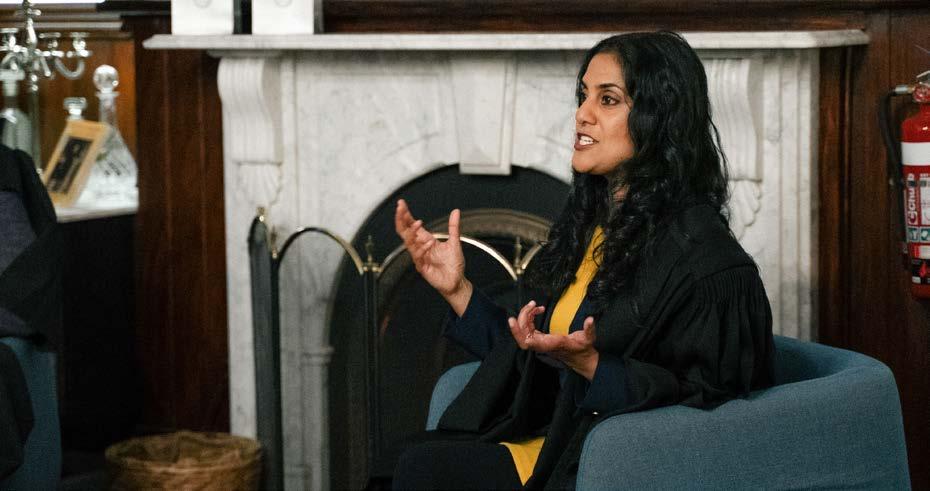
Ormond College holds a deep commitment to fostering cultural learning and community engagement. The various Welcome to Country ceremonies for significant events held at the beginning of each year or semester form an important and grounding aspect of our annual calendar. This reflects our recognition and respect for Traditional Owners and the enduring relationship that First Nations Peoples maintain with Country. Additionally, this is an important experience for our community, creating a welcoming space for First Nations peoples, and encouraging learning and understanding for those who may not have an existing relationship with Wurundjeri Country, or its Traditional Owners.
Beyond ceremonial acknowledgments, Ormond College has taken substantial strides in ensuring continuous cultural learning through various programs and initiatives. All staff and students are provided with the opportunity to participate in foundational in-person cultural learning and training. Multiple training programs are held, run specifically for both staff and student cohorts. This is a critical program towards ensuring a culturally safe community. We also regularly invite guest
First Nations speakers from a diversity of backgrounds and professions - leaders, academics and artists - to share their experiences and knowledge. The enriching insights provided by these speakers form an invaluable part of our students’ educational journey. By fostering an academic environment that values First Nations perspectives, we aim to create a campus community that is actively engaged in the ideas and values that underpin the process of reconciliation.
In the past, Ormond College has also enabled outbound community engagement, with students and staff participating in enriching cultural immersion experiences such as the Garma Festival, a visit to the Bawaka homeland in northeast Arnhem Land, and local programs within Victoria. While we currently don’t conduct these specific initiatives (having occurred before Covid-19 disruptions), we aim to scale on Country experiences in Victoria for a greater number of students. These experiences are important in shaping our continued commitment to respect for First Nations knowledge, histories, and perspectives.
Innovate Reconciliation Action Plan 13
Above:

WADE INSTITUTE OF ENTREPRENEURSHIP
The Wade Institute of Entrepreneurship has been actively engaged in programs to support First Nations economic development through greater participation in entrepreneurship and venture capital.
The Dream Venture program, delivered in partnership with Minderoo Foundation’s Generation One, is an initiative aiming to empower First Nations entrepreneurs to bring their start-up dreams to life. The Dream Venture Masterclasses includes ‘Youth’ and ‘All Ages’ programs. The ‘Youth’ program involves First Nations entrepreneurs aged 18-30, with support by the United Nations Development Programme (UNDP) and Citi Foundation’s co-led Youth Co:Lab. The success of the Dream Venture Masterclasses has led to the expansion of the program in 2023, offering $200,000 in seed funding. The program, is designed and delivered by the Wade Institute, drawing on our ability to provide tailored support to First Nations entrepreneurs through mentorship, connections with investors, and business growth guidance.
The VC Catalyst program, offered by the Wade Institute of Entrepreneurship, is an immersive executive education program designed to equip active investors with the tools and skills needed for successful early-stage venture capital investments. The program is committed to promoting diversity and inclusivity, including First Nations representation, through financial support. To ensure a diverse cohort, the program offers up to five full tuition scholarships for each cohort, specifically targeting investment-ready individuals from Victoria who are dedicated to promoting a more diverse and inclusive start-up and investment ecosystem. This financial support aims to empower individuals from underrepresented backgrounds to participate in the program and contribute their unique perspectives, fostering a richer learning experience and driving positive change in the venture capital community.

Above: Finalists at the Minderoo’s Dream Venture Pitch Gala, 2022.
14 20242026
OUR LEARNINGS

COVID-19 posed many challenges for our community A necessary but abrupt shift in operational priorities, high staff turnover, and low student retention during and following Covid-19 led to several commitments in our prior RAP not being completed We have reflected on these lessons, subsequently establishing more robust governance structures and elevating First Nations voices into our decision-making processes
This RAP will promote opportunities to reconnect internally as a college post-pandemic, and externally with organisations who can help us achieve our shared goals for reconciliation. The pandemic has challenged well-established practices within our community such as important face-to-face social and academic events, including those focussing on reconciliation initiatives. We hope to see this change through a range of enriched learning experiences and a strong sense of community connectedness.
Based on consultations with our community, achievable, targeted, and practical goals are embedded in this RAP to re-establish and extend Ormond’s relationship with First Nations peoples and organisations. However, we believe reconciliation is everyone’s responsibility, and connection to this RAP will be essential from all members of the Ormond College community.
While change can be challenging, it also presents opportunities to reflect and reengage with greater purpose. We have reflected on the lessons, progress and posture of our journey so far, subsequently refocussing our efforts towards strength-based programs, First Nations voices and the leadership potential of students. This document outlines our commitment to advocating for and enabling successes for First Nations peoples within and beyond our campus bounds.
Innovate Reconciliation Action Plan 15
CREATING THIS RECONCILIATION ACTION PLAN
The development of this RAP has been a collaborative effort between students, staff, and wider community members We have undertaken extensive stakeholder consultation across multiple years, including First Nations students, First Nations leaders within our extended community, alumni and staff This process has been led by First Nations staff, who have informed our lessons and strategy
EXECUTIVE CHAMPION
The Master sets the overall direction, delivers strategic initiatives and supports the wellbeing of the College.
• Lara McKay Master
EXECUTIVE COMMITTEE
While the RAP design, delivery, monitoring and evaluation falls under the Vice Master’s office, the broader executive committee is accountable for the deliverables that fall within their portfolios. The executive team provides strategic input and ensures tangible program outputs via their teams.
• Dr Areti Metuamate
Vice Master
• Jacqui Walker
Chief Operating and Innovation Officer
• Kim Howells
Executive Director of Engagement
RAP WORKING GROUP
Under the strategic guidance and oversight of the Executive Committee, the RAP Working Group is responsible for the operational delivery of our RAP commitments. It is a forum to coordinate implementation and ensure consistency across all business divisions and student leadership groups.
• Vice Master
• Advisor, Indigenous Projects & Mentoring (First Nations)
• Freemantle Fellow (First Nations)
• Dean of Student Success & Wellbeing
• Co-head, Indigenous student subcommittee (First Nations)
• JCR chair
• OCSC Head of Diversity
• Communications and Marketing Manager (Engagement representative)
• Accountant (Corporate representative)
• Dean of Students (Community & Student Life representative)
16 20242026
EXTERNAL FIRST NATIONS ADVISORY GROUP
Ormond College is fortunate to access guidance from recognised First Nations leaders. Dr Jessa Rogers and Dr Todd Fernando form part of this group as First Nations Residential Fellows. We also seek advice from First Nations leaders within our community, the University ecosystem and Ormond alumni network.
ACKNOWLEDGEMENTS
We would like to thank Dr Todd Fernando (2014) for leading the important foundational work in developing this RAP and for the time and knowledge shared with Ormond College over many years. We would also like to thank former Junior Dean Jaxon Hickey, the Ormond College Students’ Club Indigenous Subcommittee, and the Senior Management Team for the support and guidance in developing this RAP. The RAP Working Group was formed by current staff and students in employed positions, and intentionally includes First Nations voices; through ex-officio appointments and as is deemed appropriate by the Executive Committee. While we have valued representation and input from First Nations leaders within our extended community, it is our intention to formalise and expand these relationships through an External First Nations Advisory Group.

Dr Todd Fernando (2014) a descendant of the Kalarie peoples of the Wiradjuri nation, addresses students during Pride Week 2023.
We would also like to thank additional contributors, including:
• Di Bambra previous Vice Master
• Amba-Rose Atkinson previous Freemantle Fellow
• Rose Jost previous Acting Dean of Student Success & Wellbeing
• Francina Jodhi previous Freemantle Fellow
• Ryan Archer (2020) RAP Creative and alumni
• Casey White previous Associate Dean, Community Life
• Joel Bones previous RAP Advisor
• Georgia Vann (2011) previous Project Coordinator
• Mila Simkus (2020) previous OCSC General Committee 2022, Head of Diversity & Inclusion
• Will Stow (2018) previous OCSC General Committee 2021, Head of Diversity & Inclusion
Innovate Reconciliation Action Plan 17

18 20242026
Birri Gubba and Kunggandji Elder, Boori Monty Pryor speaking at Formal Hall during National Reconciliation Week 2023.
RELATIONSHIPS
Ormond College is a residential community that is home to First Nations Peoples, other Australians and international members Our reconciliation journey embodies a commitment to nurturing meaningful relationships with First Nations Ormondians and external First Nations Peoples, communities and organisations
Our focus is to strengthen our programs that foster safety and inclusivity, aided by external partnerships that enable our shared vision for reconciliation.
We will establish and maintain mutually beneficial relationships with First Nations stakeholders and organisations.
Meet with local First Nations stakeholders and organisations to continuously improve guiding principles for engagement. Jan 2024
Review, update and continue to implement an engagement plan to work with First Nations stakeholders and organisations. Jan 2024, 2025
Maintain and continue to build on formal two-way partnerships with Aboriginal and Torres Strait Islander communities and organisations, including existing relationships with:
• Murrup Barak at The University of Melbourne to create a wider support network for the OCIP and First Nations students.
• Dilin Duwa Centre for Indigenous Business Leadership at The University of Melbourne to create a wider support network for the Wade Institute and First Nations students.
• Wurundjeri Traditional Owners, to foster strong relationships and create a wider support network for First Nations students.
Continue to build relationships with First Nations-led organisations, supporting primary and secondary education outcomes, to foster a strong student pipeline through accessible admissions processes for First Nations students.
Jan 2024, 2025 Vice Master
We will build relationships through celebrating National Reconciliation Week (NRW).
Circulate Reconciliation Australia’s NRW resources and reconciliation materials to our staff and students. May 2024, 2025 Freemantle Fellow -
RAP Working Group members to participate in at least one external NRW event. Jun 2024, 2025 Indigenous Strategy Freemantle Fellow
Encourage and support staff, senior leaders, and students to participate in at least one external event to recognise and celebrate NRW.
• Promote NRW events organised by The University of Melbourne
• Promote NRW events organised by other residential colleges to staff and students.
• Promote NRW events organised by local First Nations communities.
Jun 2024, 2025 Freemantle Fellow
Action Deliverable Timeline Lead Responsibility Support Responsibility
Freemantle
Indigenous Strategy
Fellow
Indigenous
Executive Director
Strategy
Engagement
Executive Director Engagement
Jun 2024 Executive Director Engagement Indigenous Strategy
Indigenous Strategy
Innovate Reconciliation Action Plan 19
We will promote reconciliation through our sphere of influence.
Host a program of internal NRW events at Ormond College recognising and promoting education regarding NRW.
• Organise a NRW learning event and a Mabo Day event for staff and students each year.
• Hold a NRW Formal Hall event and acknowledge staff and student contributions to reconciliation throughout the academic year.
• Collaborate with The University of Melbourne and other residential colleges to attend or host a NRW event.
• Support the student body to facilitate a ‘Fridays@1’ Q&A on reconciliation.
Fly the Aboriginal and Torres Strait Islander Flags on the Main Building heritage flagpole for NRW, instead of the Ormond College flag. The Aboriginal and Torres Strait Islander Flags are flown permanently at the main entrance.
Register all our NRW events on Reconciliation Australia’s NRW website.
Implement strategies to engage all staff, students and community to drive reconciliation outcomes.
Communicate our commitment to reconciliation internally and publicly.
Implement a strategy to positively influence our external stakeholders, including alumni and donors, to drive reconciliation outcomes.
Collaborate with other like-minded and RAP-aligned organisations to develop innovative approaches to advance reconciliation.
• Murrup Barak, University of Melbourne.
• Dilin Duwa Centre for Indigenous Business Leadership.
• Other residential colleges.
• Generation One, Minderoo Foundation.
• Ormond alumni and donor community.
Collaborate with other residential colleges to assess common needs, share resources, and develop opportunities that support First Nations student successes and self-determination.
Invite staff and students from The University of Melbourne and other residential colleges to events hosted at Ormond College, such as the Renate Kamener Oration.
Investigate initiatives to elevate First Nations voices, experiences and perspectives within our community, as a place of education. This can include additional academic seminars, lectures and orations, delivered by First Nations academics, the Freemantle Fellow, and First Nations community leaders.
May 2024, 2025 Dean of Students Freemantle Fellow
May 2024, 2025 Operations Director -
May 2024, 2025 Indigenous Strategy Freemantle Fellow
Dec 2024 Freemantle Fellow Associate Director People & Capability
Jan 2024 Master Executive Director Engagement
Mar 2024 Executive Director Engagement Indigenous Strategy
Mar 2024 Indigenous Strategy Fremantle Fellow
Jan 2024 Freemantle Fellow Indigenous Strategy
Aug Annually Executive Director Engagement Indigenous Strategy
Dec 2024 Freemantle Fellow Indigenous Strategy
Action
Lead Responsibility Support Responsibility
Deliverable Timeline
20 20242026
We will promote positive race relations through anti-discrimination strategies.
Engage with First Nations staff and/or advisors to continuously improve our anti-discrimination policy.
Implement and communicate anti-discrimination policies and procedures, to engage and educate all members of the College community on racism.
Provide ongoing education opportunities for senior leaders and managers on the effects of racism.
Conduct a review of HR policies and procedures, including the induction process, to identify existing anti-discrimination provisions, future needs, and opportunities for improvement.
Continuously improve HR policies and procedures concerned with antidiscrimination.
We will ensure that Ormond College is a culturally supportive residence for First Nations students and staff.
Engage First Nations advisors and students to improve recruitment and retention strategies of First Nations students at the College.
Investigate formal feedback opportunities from First Nations students to inform and develop support strategies.
Investigate the relevance and viability of establishing a dedicated space on the college grounds, designed for First Nations ceremonies, reflection and learning. For example, a landscaped garden and fire pit.
Review the current resourcing model for the OCIP, such as the Freemantle Fellow position, other support roles, to ensure they are appropriate and effective.
We will ensure that Ormond College is a financially accessible residence for First Nations students.
Review financial assistance options at the College to ensure that finances are not a barrier for current and prospective First Nations students to join the College.
Maintain our commitment to ensuring financial access for First Nations students with annual fundraising campaigns.
Provide financial guidance to First Nations students regarding internal and external financial assistance options, ABSTUDY and other scholarship opportunities.
2025 Director of Advancement
Action Deliverable Timeline Lead Responsibility Support Responsibility
Jan 2024 Associate Director People & Capability Vice Master
Jun 2024 Associate Director People & Capability Vice Master
Dec 2024 Associate Director People & Capability Vice Master
Dec 2024 Associate Director People & Capability Vice Master
Dec 2024 Associate Director People & Capability Chief Operating and Innovation Officer (COIO)
Jan 2024 Freemantle Fellow Indigenous Strategy
Jun 2024 Freemantle Fellow Indigenous Strategy
June 2024 Vice Master Operations Director
Jan 2024 Vice Master -
Jan 2024 Executive Director Engagement Freemantle
-
Nov 2024,
Mar 2024 Admissions Manager Freemantle Fellow Innovate Reconciliation Action Plan 21
RESPECT
Ormond College is a long-standing educational institution that is founded on the lands of the Wurundjeri People As an academic institution, Ormond College prides itself on nurturing future leaders – in business, politics, science and the arts An emphasis on education, celebration and appreciation of First Nations cultures and histories, equips our community to become champions of reconciliation in future careers and lives This can only occur credibly with a foundation of respect and truth-telling
Our focus is to develop and promote the education, understanding, and respect of contemporary and historical First Nations narratives for all members of Ormond College.
We will increase understanding, value and recognition of First Nations cultures, histories, knowledge and rights through cultural learning. Conduct a review of cultural learning needs and our existing programs within our organisation.
Continue to consult local Traditional Owners and/or First Nations advisors to extend the scope of our existing cultural learning strategy and cultural awareness training programs.
Continue to implement, review and communicate our cultural learning strategy for staff and students.
All RAP Working Group members, HR managers, senior executive group, staff in pastoral care and community roles and all new staff to undertake formal and structured cultural learning.
Continue to provide opportunities for all staff and students to participate in formal and structured cultural learning. This will continue to be embedded within staff onboarding and student orientation, to ensure high participation within the Ormond community.
Promote events at The University of Melbourne related to First Nations cultures, histories, and achievements to staff and students.
Action Deliverable Timeline Lead Responsibility Support Responsibility
Mar 2024 Associate Director People & Capability Indigenous Strategy
Jun 2024 Indigenous Strategy Associate Director People & Capability
Jan 2024 Associate Director People & Capability Indigenous Strategy
Dec 2024 Associate Director People & Capability Indigenous Strategy
Dec 2024 Associate Director People & Capability Indigenous Strategy
Jun 2024 Freemantle Fellow Master
22 20242026
We will demonstrate respect to First Nations peoples by observing cultural protocols.
Increase staff and student understanding of the purpose and significance behind cultural protocols, including Acknowledgement of Country and Welcome to Country protocols.
Develop, implement, and communicate a cultural protocol guidelines document (tailored for all local communities we operate in), including protocols for Welcome to Country and Acknowledgement of Country. This will set expectations and provide guidance regarding:
• Requirements to deliver an Acknowledgement of Country and other appropriate protocols at the commencement of important meetings.
• Requirements for staff and senior leaders to provide an Acknowledgement of Country or other appropriate protocols at all public events.
Invite a local Traditional Owner or Custodian to provide a Welcome to Country or other appropriate cultural protocol at significant events each year.
• Orientation week
• Reorientation week
• NAIDOC week
Inform new staff and students about our RAP approach, programs, guidance and the Country we are located on during onboarding and orientation periods. This will include information such as Billibellary’s Walk, and the Acknowledgment of Country plaque located in the College Main Building.
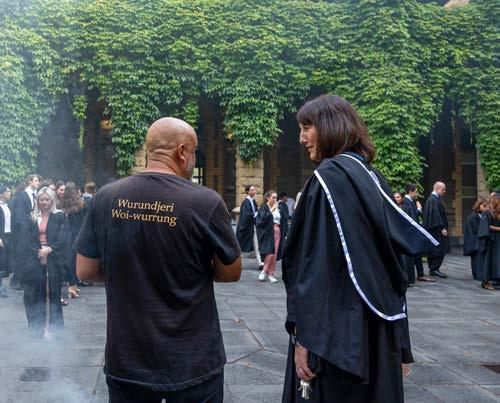
Mar 2024, 2025
Aug 2024, 2025 Vice Master Freemantle Fellow
Mar 2024, 2025
Aug 2024, 2025
Action Deliverable Timeline Lead Responsibility Support Responsibility
Feb
2024 Vice Master COIO
Indigenous
Mar 2024
Strategy Communications and Marketing Manager
Associate
Vice
Innovate Reconciliation Action Plan 23
Director People & Capability
Master
We will build respect for First Nations cultures and histories by celebrating NAIDOC Week.
RAP Working Group to participate in an external NAIDOC Week event.
Support all staff and students to participate in at least one NAIDOC Week event in our local area.
In consultation with First Nations stakeholders, support at least one external NAIDOC Week event each year.
• Review HR policies and procedures to remove barriers to staff participating in NAIDOC Week.
Fly the Aboriginal and Torres Strait Islander Flags on the Main Building heritage flagpole for NAIDOC week, instead of the Ormond College flag. The Aboriginal and Torres Strait Islander Flags are flown permanently at the main entrance.
We will acknowledge key historical and contemporary dates and the achievements of First Nations peoples in the College calendar. We will facilitate and promote learning associated with these dates of significance.
Jul 2024, 2025 Indigenous Strategy Fremantle Fellow
Aug 2024, 2025 Vice Master Freemantle Fellow
Jul 2024, 2025 Vice Master Freemantle Fellow
Apr 2024 Associate Director People & Capability Indigenous Strategy
Jul 2024, 2025 Aug 2024, 2025 Operations Director -
Feb 2024 Vice Master Freemantle Fellow
We will engage in a meaningful and respectful process of truth-telling.
Host at least one Formal Hall and/or seminars each semester with a focus on First Nations histories, truth-telling or topical issues (in addition to NRW events, NAIDOC week events and the Renate Kamener Oration).
Support the OCSC and GC in delivering ‘Fridays@1’ discussions on NRW, NAIDOC week, and two other relevant topics.
Support the OCSC and GC in delivering their annual commitment towards the Ormond Indigenous Voices project.
Explore opportunities to deliver structured learning on First Nations histories, such as a winter or summer intensive course, available to staff and students. We will explore opportunities to collaborate with other residential colleges to enhance delivery, participation and impact.
Explore opportunities to integrate truth-telling and First Nations design principles, via place-based strategies within our capital works program; addressing a broad range of principles, including remediation, respect, engagement and education.
Explore an appropriate and culturally safe process to identify and review the historical and ongoing relationships of Ormond College, our community and notable benefactors with First Nations peoples and communities.
Dec 2024 Dean of Students Freemantle Fellow
Dec 2024 Freemantle Fellow Dean of Students
Jan 2024 Master Freemantle Fellow
Jun 2024 Freemantle Fellow Director of Learning
Jun 2024 COIO Indigenous Strategy
Dec 2024 Master Vice Master
Action
Lead Responsibility Support Responsibility
Deliverable Timeline
24 20242026
OPPORTUNITIES
Ormond College strives to create equitable opportunities for all students to reach their academic and personal potential Additionally, Ormond prides itself on being a diverse and welcoming workplace It is important to Ormond College to be known to First Nations Peoples as an enabling environment for academic and vocational success, reflected in recruitment, retention and student experience patterns
Our focus is to support the leadership potential of First Nations Ormondians, through academic success, career opportunities, and facilitating community connections.
We will foster a connected and culturally grounded community of First Nations residents and students.
We will support career development outcomes for First Nations students and alumni.
Develop and maintain a calendar of events, seminars and casual engagement opportunities for First Nations students and staff.
Support the Indigenous Student Subcommittee to design and deliver events and engagement opportunities.
Explore opportunities to connect the broader Ormond College First Nations community, including current students and alumni.
Establish a calendar of events for First Nations students each semester.
Proactively engage students to discuss ideas and ambitions, ensuring direction and support is provided.
Investigate professional development strategies, opportunities, and resources for First Nations students.
Explore opportunities to connect First Nations students and mentors.
We will support leadership development outcomes for First Nations students and alumni.
Explore opportunities to enable stronger connections between First Nations students, local Traditional Owners and the Country on which we learn, work and live.
Investigate leadership and personal development initiatives to develop for First Nations students.
Investigate opportunities to engage philanthropic and partner organisations to enhance and scale relevant First Nations programs at Ormond College.
Action Deliverable Timeline Lead Responsibility Support Responsibility
Mar 2024 Freemantle Fellow Indigenous Strategy
Mar 2024, 2025 Freemantle Fellow Indigenous Strategy
Feb 2024 Freemantle Fellow Indigenous Strategy
Feb 2024 Freemantle Fellow Indigenous Strategy
Mar 2024 Freemantle Fellow Indigenous Strategy
Dec 2024, 2025 Careers Advisor Freemantle Fellow
2024 Careers Advisor Freemantle Fellow
Jun
Mar 2024 Freemantle Fellow Indigenous Strategy
Mar 2024 Freemantle Fellow Indigenous Strategy
Jan 2024 Director Advancement Indigenous Strategy
Innovate Reconciliation Action Plan 25
We will support greater First Nations participation in entrepreneurial and venture capital endeavours.
Deliver the Dream Venture Masterclass in partnership with Minderoo in 2023. Review success and learning to explore future opportunities to continue delivering the program in 2024 and beyond.
Maintain philanthropic and sponsorship relationships, to ensure programs such as the VC Catalyst program and Master of Entrepreneurship are financially accessible for First Nations participants.
Explore opportunities to integrate further First Nations initiatives within the Wade Institute of Entrepreneurship strategy.
Explore industry and shared value partners to enhance and expand the impact of our programs.
Jan 2024
of
and Enterprise -
Jan 2024
and Enterprise
Dec 2024
Dec 2024
and Enterprise
and Enterprise
Strategy
We will improve employment outcomes by increasing First Nations recruitment, retention, and professional development.
Build an understanding of current First Nations staffing to inform future employment and professional development opportunities. Mar
Engage with First Nations staff to consult on our recruitment, retention, and professional development strategies. Mar
Review and update a First Nations recruitment, retention and professional development strategy.
Advertise job vacancies to effectively reach First Nations stakeholders.
Review HR and recruitment procedures and policies to remove barriers to First Nations participation in our workplace.
& Capability
We will increase First Nations supplier diversity to support improved economic and social outcomes.
Develop and implement a First Nations procurement strategy.
Investigate potential relationships and memberships with organisations such as Supply Nation or Kinaway.
Develop and communicate opportunities for procurement of goods and services from First Nations businesses to staff.
Review and update procurement practices to remove barriers to procuring goods and services from First Nations businesses.
Develop commercial relationships with First Nations businesses.
Action
Timeline Lead Responsibility Support Responsibility
Deliverable
Director
Innovation
Director
Innovation
Director
of
of Advancement
Director
Innovation
Indigenous
of
Strategy
Director
Innovation
Indigenous
of
2024 COIO Associate Director People
Capability
&
COIO Associate Director People & Capability
2024
COIO Associate Director People & Capability
Mar 2024
Mar
Associate
People
2024 COIO
Director
& Capability
Mar
COIO Associate
People
2024
Director
Jan 2024 COIO Operations Director
Jan 2024 COIO Operations Director
Mar 2024 COIO Operations Director
Jun 2024 COIO Operations Director
Dec 2024 COIO Operations Director 26 20242026
GOVERNANCE
We will establish and maintain an effective RAP Working group (RWG) to drive governance of the RAP.
We will establish and maintain an external First Nations advisory group.
Maintain First Nations representation on the RWG. Jan 2024, 2024 Master Vice Master
Review, edit and apply the Terms of Reference for the RWG. Jan 2024 Indigenous Strategy Vice Master
Meet at least four times per year to drive and monitor RAP implementation. Dec 2024, 2025 Indigenous Strategy Vice Master
Establish purpose and terms of reference for an external First Nations advisory body. Jan 2024
Engage two senior First Nations Residential Fellows to support the External Advisory Group. Jan 2024
Explore opportunities for First Nations representatives from partner organisations within the University of Melbourne community to support the External Advisory Group. Jan 2024 Indigenous Strategy Vice Master
Explore opportunities for Traditional Owners to support the External Advisory Group. Jan 2024 Indigenous Strategy Vice Master
Explore opportunities for First Nations alumni to support the External Advisory Group. Jan 2024
We will provide appropriate support for effective implementation of RAP commitments.
Define resource needs for RAP implementation. Jan 2024
Engage our senior leaders and other staff in the delivery of RAP commitments. Jan 2024 Vice Master
Define and maintain appropriate systems to track, measure and report on RAP commitments. Jan 2024 Indigenous Strategy COIO
Appoint and maintain an internal RAP Champion from senior management. Jan 2024 Master -
Action Deliverable Timeline Lead Responsibility Support Responsibility
Indigenous
Strategy Vice Master
Indigenous
Strategy Vice Master
Indigenous
Strategy Vice Master
Indigenous
Strategy Vice Master
COIO
Innovate Reconciliation Action Plan 27
We will build accountability and transparency through reporting RAP achievements, challenges and learnings both internally and externally.
Contact Reconciliation Australia to verify that our primary and secondary contact details are up to date, to ensure we do not miss out on important RAP correspondence.
Contact Reconciliation Australia to request our unique link, to access the online RAP Impact Measurement Questionnaire.
Complete and submit the annual RAP Impact Measurement Questionnaire to Reconciliation Australia.
Report RAP progress to all staff, senior leaders, and students quarterly.
Jun 2024, 2025 Indigenous Strategy Vice Master
1 Aug 2024, 2025 Indigenous Strategy Vice Master
30 Sep 2024, 2025 Indigenous Strategy
Mar 2024, 2025
Jun 2024, 2025
Sep 2024, 2025
Dec 2024, 2025 Indigenous Strategy Vice Master
Publicly report our RAP achievements, challenges and learnings, annually.
Investigate participating in Reconciliation Australia’s biennial Workplace RAP Barometer.
Submit a traffic light report to Reconciliation Australia at the conclusion of this RAP.
Oct 2024, 2025 Marketing and Communications Manager Indigenous Strategy
Jun 2024 COIO Associate Director People & Capability
Jan 2026 Indigenous Strategy Vice Master
We will continue our reconciliation journey by developing our next RAP. Register via Reconciliation Australia’s portal to begin developing our next RAP. Aug 2025 Indigenous Strategy Vice Master
We’ll support the leadership potential of First Nations Ormondians, through academic success, career opportunities and facilitating community connections.
Action Deliverable Timeline Lead Responsibility Support Responsibility
Vice Master
“ 28 20242026
@OrmondCollege T: 61 3 9344 1100 alumni@ormond.unimelb.edu.au ormond.unimelb.edu.au

























